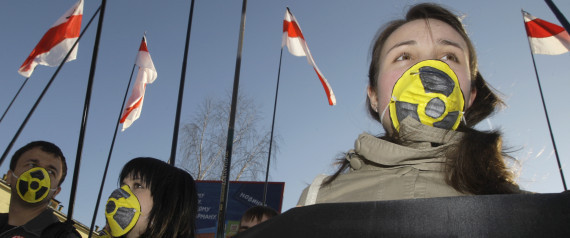'Chernobyl Baby' Explains Life In A Fallout Zone

First Posted: 03/17/11 03:33 PM ET Updated: 05/25/11 07:40 PM ET
Nastassia Astrasheuskaya joined Reuters as a correspondent in December 2010. She was born on Aug. 31, 1989, in the Belarussian city of Mogilev, three years after the nuclear disaster at the Ukrainian Chernobyl, 500 km (320 miles) away.
By Nastassia Astrasheuskaya
MOSCOW (Reuters) - I wasn't even born when Chernobyl blew up, but its deadly legacy haunted my childhood.
One girl at my school had six fingers on one hand. My thyroid gland is permanently enlarged and the fear of cancer will never leave me or my family.
It is a fate I would not wish on the Japanese people living in the shadow of the tsunami-damaged Fukushima reactors, and wondering what the effects will be on them.
I was born on August 31, 1989, in the Belarussian city of Mogilev, 500 km (320 miles) from Chernobyl. Mogilev was at the epicenter of the radiation cloud blown toward Belarus after the fire at the Ukrainian nuclear power plant in April 1986.
I didn't experience what happened but I heard my parents speak of it many times.
They didn't know what was happening when this smog hung around for days. There was no official explanation: nothing on television, nothing on the radio, not a word from officials.
Those who did know the truth advised their children to stay indoors. They didn't want to cause panic among the masses who walked the polluted streets unaware of what they were breathing in.
The Soviet government took several days to realize the Chernobyl explosion could not be covered up, even though the outside world knew a major release of radiation had taken place.
When my parents found out about the danger, they had to make quick decisions. My mother and brother were to go to Moscow, which was affected by much less radiation than Mogilev.
My father was to stay in Mogilev and continue working.
Breathing was dangerous, but the family needed money.
"Your brother was five at the time," my mother told me. "We had to take him away."
They packed and left for Moscow to stay with my uncle, Mom's brother. "We stayed there for five months," Mom said. "But then we realized that nothing was going to change any time soon, and we went back to your father."
BIRTH RATE FELL
Emigration was not a viable option then.
I was born three years later.
The birth rate had begun falling steeply because people saw various defects in babies born after the disaster, and did not dare to have children of their own. I went to school with a girl who had arm defects.
It was scary but we got used to it.
As with most people living in Belarus after the accident, my thyroid gland was much bigger than normal. We lived under constant threat of getting thyroid cancer.
Belarus was the country most contaminated by the fallout from Chernobyl, and completely clean areas are still rare.
The water ruined our teeth. We had very specific places where the radiation levels were lower and we could pick mushrooms and berries.
I remember seeing large forest areas fenced off with barbed wire with scary yellow signs reading "radiation danger" everywhere.
My generation, especially those living in regions close to the border with Ukraine, became known as "Children of Chernobyl."
Sympathetic foreigners started organisations to help kids from contaminated areas improve their health.
They would take us away from Belarus to Europe or the U.S. for several weeks each summer so we could fix our teeth, eat healthier food and clean our lungs with fresher air.
Children born today, almost 25 years after the explosion, remain under threat, as will their children and grandchildren, because radiation doesn't disappear that fast.
I know that being exposed to radiation in my childhood, I will always carry its effects in my body and probably pass them on to my children, regardless of where they are born.
But there is nothing I can do now, other than stay away from those fenced forests and fields.
(Editing by Robert Woodward)